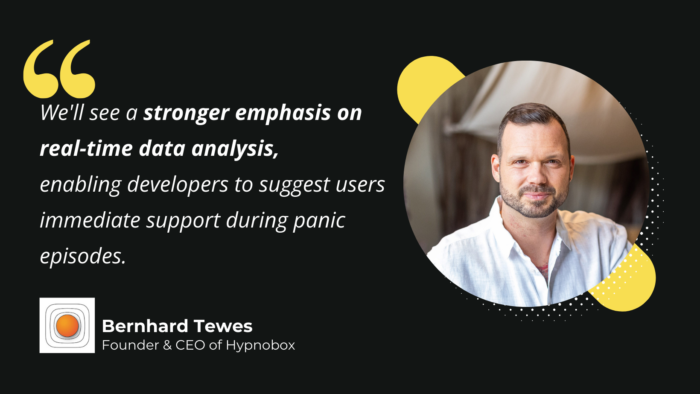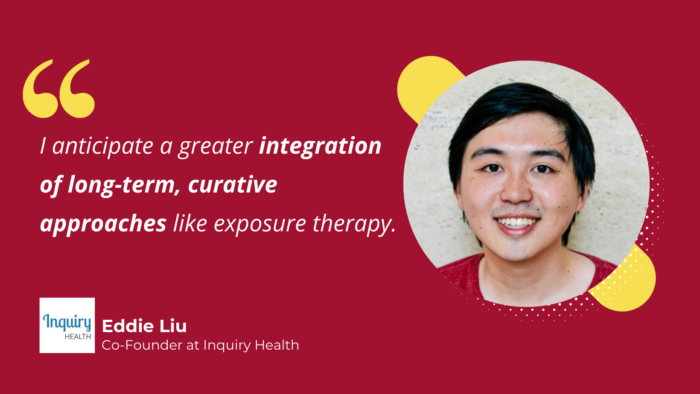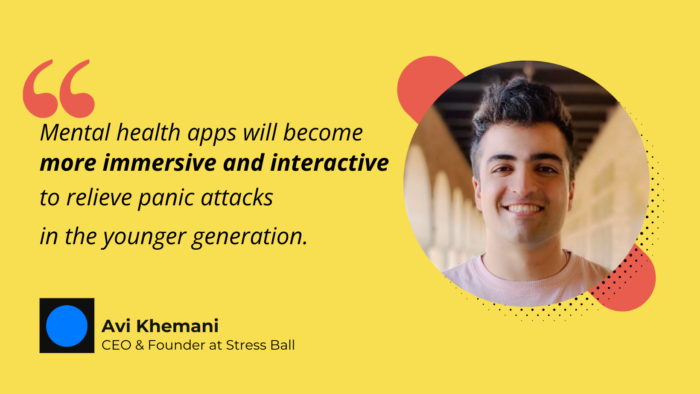Digital Wellbeing: How Tomorrow’s Apps Will Revolutionize Mental Health Care
Learn from industry experts about the future of mental health apps. What innovations and what challenges can we expect?
Imagine a world where your smartphone becomes a pivotal tool in managing, and even preempting, panic attacks or moments of heightened anxiety. As technology rapidly evolves, the way we perceive and approach mental health care is set to undergo significant transformation. Today’s mental health apps are only the tip of the iceberg, hinting at a vast potential that awaits us in the coming years.
To get a sneak peek into the thrilling future of mental health tech, we’ve reached out to people immersed in the industry. These are the innovators who have harnessed the power of technology to create applications catering to those who experience mental health challenges.
Diving into this topic isn’t just about predicting the next app trends; it’s about envisioning how technology can further bridge gaps in mental health care. As we rely more on apps for support, the implications are vast.
It’s vital to anticipate and address challenges, to harness emerging technologies responsibly, and to ensure that the future of mental health apps remains user-centric. As you read on, we invite you to ask yourself too: What do you anticipate in the future of digital mental wellbeing?
Same 3 questions, 4 different takes.
Let’s see what the industry has to say!
Meghan Davis, CEO at Mind Ease

How do you envision the evolution of mental health apps, especially those focused on panic attacks, in the next 5 years?
We’re really seeing a shift toward using technology to provide support around mental health and wellbeing, and apps will be an increasingly big part of making mental health care more accessible and affordable over the next five years. There’s increasing evidence that coaches, peer supporters and even chatbots can be very effective at providing basic support around mental health and wellbeing.
I expect we’ll see a rise in apps which offer tiered levels of services based on the user’s needs, moving from basic levels of support such as coaching to more traditional mental health professionals. We’re also seeing mental health apps becoming more fun and gamified, which is really important for supporting people to make it through self-guided courses, which we know can be effective if completed. For panic attacks specifically, I expect to see a rise in technology-driven tools like biofeedback, which can be really effective for support people through the worst of a panic attack.
What emerging technologies or methodologies are you excited to possibly integrate into your app?
The digital mental health field is expanding rapidly, which is really opening up the ways we support people around their mental health. I’m really excited about the potential for AI to personalise and humanise mental health support, for example by tailoring learning modules to users’ needs or providing empathetic listening services. Also, there are many mental health apps which provide generic support around stress, depression and anxiety, but few which provide tailored, evidence-based treatment for less common conditions, like panic attacks, social anxiety and agoraphobia. I’m really excited to work on making evidence-based support more accessible for a wider range of conditions.
Are there any new challenges in mental health that you believe apps will need to address in the near future?
Over the next few years, we expect more than a billion people to access the internet for the first time. This includes younger and older users, as well users in low- and middle-income countries, where demand for mental health services is sky-rocketing. Mental health app developers should expect to design for an increasingly diverse range of users, keeping in mind factors like accessibility, device constraints and localisation.
It’s also really important to make sure that the mental health support we offer is personalised for users’ needs – for example, offering culturally relevant interventions or tailoring content for older or younger users.
Bernhard Tewes, Founder & CEO of Hypnobox

How do you envision the evolution of mental health apps, especially those focused on panic attacks, in the next 5 years?
Over the next 5 years, I envision mental health apps evolving in several ways. First, they will most likely become more personalized and tailored to individual user needs. Additionally, we’ll see a stronger emphasis on real-time data analysis, enabling developers to suggest users immediate support during panic episodes. Integration with wearables like smart watches can also play a significant role in analyzing user’s behavior patterns and personalizing suggestions.
What emerging technologies or methodologies are you excited to possibly integrate into your app?
We have plans to integrate some gamification elements into HypnoBox in the near future. Gamification is a powerful tool to enhance user engagement and motivation, and make their therapeutic journey more enjoyable and interactive. This approach will facilitate positive behavioral changes and better management of panic attacks and anxiety.
Are there any new challenges in mental health that you believe apps will need to address in the near future?
Despite growing acceptance of mental health apps, there is still a stigma around using digital tools for mental health support. Apps will need to work on destigmatizing the use of technology for mental well-being and ensuring that users feel comfortable seeking help through digital platforms. Also, mental health apps will need to improve their ability to identify users in crisis and provide immediate support.
Eddie Liu, Co-Founder at Inquiry Health

How do you envision the evolution of mental health apps, especially those focused on panic attacks, in the next 5 years?
I believe mental health apps focused on panic attacks will evolve to offer a more comprehensive range of evidence-based solutions. While immediate relief is valuable, I anticipate a greater integration of long-term, curative approaches like exposure therapy. This shift will aim to address the root causes of panic attacks instead of only coping techniques.
What emerging technologies or methodologies are you excited to possibly integrate into your app?
I’m especially excited about harnessing the potential of AI technologies to redefine mental health care. Advanced machine learning algorithms can already adapt the app to individual needs and provide real-time feedback. As this technology matures, I foresee apps becoming a more dynamic and responsive mental health partner, continuously updating the app based on user behavior and feedback.
Are there any new challenges in mental health that you believe apps will need to address in the near future?
Predicting the future is tricky, but based on current trends, I don’t foresee any major shifts in mental health challenges in the immediate future. Especially compared to what we’ve seen in the recent past with the pandemic wreaking havoc on mental health, and the bigger trend in lowered teenage mental health over the past decade.
Avi Khemani, CEO & Founder at Stress Ball

How do you envision the evolution of mental health apps, especially those focused on panic attacks, in the next 5 years?
Over the next 5 years, I believe that mental health apps will become more immersive and interactive to relieve panic attacks in the younger generation. With the rise of short-form video on TikTok and Instagram, people are becoming dependent on visual and auditory content, and need highly sensory experiences to alleviate stress. Since panic attacks are rooted in emotions, new apps will try to distract users with soothing visuals, sounds, vibrations, and more.
What emerging technologies or methodologies are you excited to possibly integrate into your app?
For Stress Ball, I’m excited about the opportunity to bring it to VR devices like Oculus and Apple Vision Pro. These VR devices can provide a lot more capabilities to create immersive experiences, which will help relieve stress with different modes of sensory input. I’m also interested in exploring real-world interactive experiences that can relax people without relying on a technology device.
Are there any new challenges in mental health that you believe apps will need to address in the near future?
I believe that the biggest challenge in the near future is addressing the shorter attention span in users. Guided meditation seen in apps like Headspace and Calm rely on the user being able to focus for longer periods to follow along. But, with smartphones and short-form content, people are having a much harder time focusing on one thing, and mental health apps will have to find new ways to engage their audience in a quick and simple way.
So, now that you got the industry perspective, what do you think the future of mental health apps will be?




